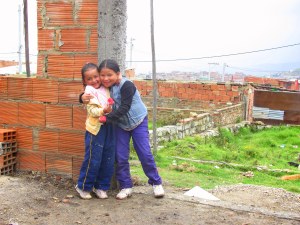 As mentioned before, naturopaths are not necessarily defined by our toolbox of modalities. What, then, does define us as a profession? As we witness a rise in the demand for complementary and alternative medicine, and with it, the rise in something called the “Holistic Medical Doctor”, what sets naturopathic doctors apart?
As mentioned before, naturopaths are not necessarily defined by our toolbox of modalities. What, then, does define us as a profession? As we witness a rise in the demand for complementary and alternative medicine, and with it, the rise in something called the “Holistic Medical Doctor”, what sets naturopathic doctors apart?
I recently read an article by Marg Martin, ND about naturopathic philosophy and the power of the naturopathic interview. For those of you who don’t know, naturopathic visits are typically an hour in length, in which the patient is asked to give his or her complete medical history and should be given free range to talk about anything his or her heart desires.
When a friend or family member expresses desire to talk about a problem, most people respond in one of three ways; negating your feelings “oh, you shouldn’t feel that way”, talking about themselves, “I know how you feel, in fact just last week the same thing happened to me…” or offering advice. Most people aren’t looking for these responses when sharing their problems, but are rather looking for an empathetic ear and validation of their feelings. However, even after practicing empathetic interviewing skills in first year health psychology I found it hard to apply this skill to real life, especially with friends and family. I often feel pressured to come up with a solution for someone’s problems, to help them in a practical way or say something comforting to enlighten them and give them comfort. It sometimes feels awkward to simply nod my head and say “go on”, even though this might be exactly the response that people need.
I had a chance to practice my interview skills (and in a second language, at that) while in Colombia last summer. I signed up for a volunteer job with Un Techo Para Mi País ( A Roof For My Country), which is a non-profit organization that builds emergency housing for families in need. My job was not to build houses, but rather conduct an hour long interview with families that wanted to apply for one and to decide if they were eligible for a Techo house.
The job took place in the district of Cuidad Bolívar, in Colombia’s capital city, Bogotá. Even though I´d lived in Bogotá for a year and half, I´d never ventured into Cuidad Bolivar, which is a starkly different environment from that of the rest of Bogotá, This huge favela, located at 3000 metres (10,000 feet) above sea level, is peppered with dirt roads and make-shift shacks, with very few amenities. Robberies, murders and attacks from some of Colombia’s guerilla groups are commonplace. The population of the district is made up of the half a million Colombians who were displaced because of the on-going civil war. This is not an area where many Northern Bogotanos or foreigners feel at home. My team and I spent the nights there, sleeping on the cold, hard floor of a local school house. However, our living conditions were far superior to that of most of the families that we interviewed.
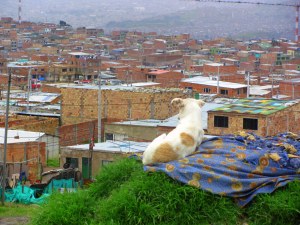 At first the interviewing process felt awkward. It is strange to step out of our comfortable, Western world, where almost every student can afford an iPhone or Canada Goose coat, without giving it much consideration, and try to relate to the people of Cuidad Bolívar. I wasn´t sure if I was insulting the families on whose door I knocked, by asking them if they would like to apply for a house. After all, they’d struggled to make the best life they could for their families and I didn’t want to give them the impression that I thought that life wasn’t good enough in some way. Many of the people I interviewed had never met a foreigner before and I wasn´t sure what ideas they held about the world I came from or what they might have heard about the naive, even condescending views a North American might have about stooping down to graciously save them from their “misery”.
At first the interviewing process felt awkward. It is strange to step out of our comfortable, Western world, where almost every student can afford an iPhone or Canada Goose coat, without giving it much consideration, and try to relate to the people of Cuidad Bolívar. I wasn´t sure if I was insulting the families on whose door I knocked, by asking them if they would like to apply for a house. After all, they’d struggled to make the best life they could for their families and I didn’t want to give them the impression that I thought that life wasn’t good enough in some way. Many of the people I interviewed had never met a foreigner before and I wasn´t sure what ideas they held about the world I came from or what they might have heard about the naive, even condescending views a North American might have about stooping down to graciously save them from their “misery”.
However, I´m always astounded by the warmth of the Colombian people, especially those of lower economic means. My interviewing partner and I were offered coffee, treats and anything else the families had on hand. We were greeted into their small homes warmly and were generously offered up their stories, each one more heart-breaking than the next. The majority of the families that we interviewed were among the displaced population of Colombia. Most had lost everything but, despite their losses, maintained an optimistic attitude and a desire to move forward.
One family that I interviewed had a story, which to this day still grips me. We were approached, while walking down one of the dirt roads, by a slim, young woman. She asked if we would interview her to determine her eligibility for a house. We entered a worn, teetering shack, made of a mishmash of materials, jotting down observations of the obvious holes in the roof and walls, and the dirt floors. She offered us a seat at a table beside a bed on which a a very thin old man with atrophied legs was lying, hooked up to an oxygen tank. She then began to quietly tell us her story:
She lived with her three small children, her brother, who suffered from schizophrenia, and her 85-year old father, who had a long list of health concerns. They had just moved into this neighbourhood where they´d bought this house (and the land on it). She and her family had been displaced due to the violence and forced to move to Bogotá. She´d been forced to move to this neighbourhood, and take over as head of family, when, only 3 months ago, her husband had been murdered by thieves who´d tried to steal his cell phone. She estimated her earnings to be less than $50 a month, with which she had to support herself and her 5 dependent family members. As she told me this story her eyes (as well as those of my partner and I) filled with tears. In this moment I felt so overcome with emotion that I remember feeling at a loss for words. How could I relate to this woman? What could I do for her? In a few weeks she had lost more than any human does in a lifetime, she had no way to support her family and there was no organization that could reach in and make it better. There probably weren’t many that would even try. I knew I could try to assure her that her application would be placed at the top of the list for a new house, but that would still leave her without financial support, her husband and her old home. She would still have to pay 10% of the cost of the emergency house and build her self a bathroom and cooking area, which are not allowed inside the wood emergency homes. It was hardly a solution. What could I say to her?
As she sat at her kitchen table with her head in her hands, I looked up at her, making eye contact, gathered all the feelings of love and empathy I could muster, and said, in my accented Spanish “lo siento mucho” (I’m very sorry). Even with these simple, almost useless, words, I could see the change in her expression. She seemed to remember herself, despair faded to hope and, although still sad, her eyes brightened slightly with a shadow of gratitude and optimism. “Gracias.” She said. She wasn’t thanking me for the words, or for the fact that I was in her house to perhaps offer her the opportunity to turn her weathered shack into a 7x 11 m2 wood emergency shelter, but simply for the opportunity to tell her story to empathetic ears and for someone taking the time to hold space for her and her grief. Even though I didn’t share and, therefore, could never truly understand her experience, we still shared the knowledge that human suffering is a universal language. Although, by a simple, unjust matter of fate, we ended up coming from two very different worlds (one of privilege and the other of struggle), I was able to, for a moment, share her emotions and offer her validation for them.
Despite being only a weekend, the days I spent with Un Techo Para Mi País was one of the most powerful, emotional experiences of my life. It helped me connect with the people of Colombia, a country that was my home for 2 years, but most of all, it taught me the power of empathy and instilled me with confidence in the power of the naturopathic interview for bringing about healing, optimism and hope for change.


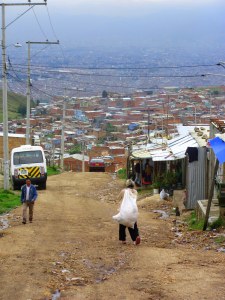
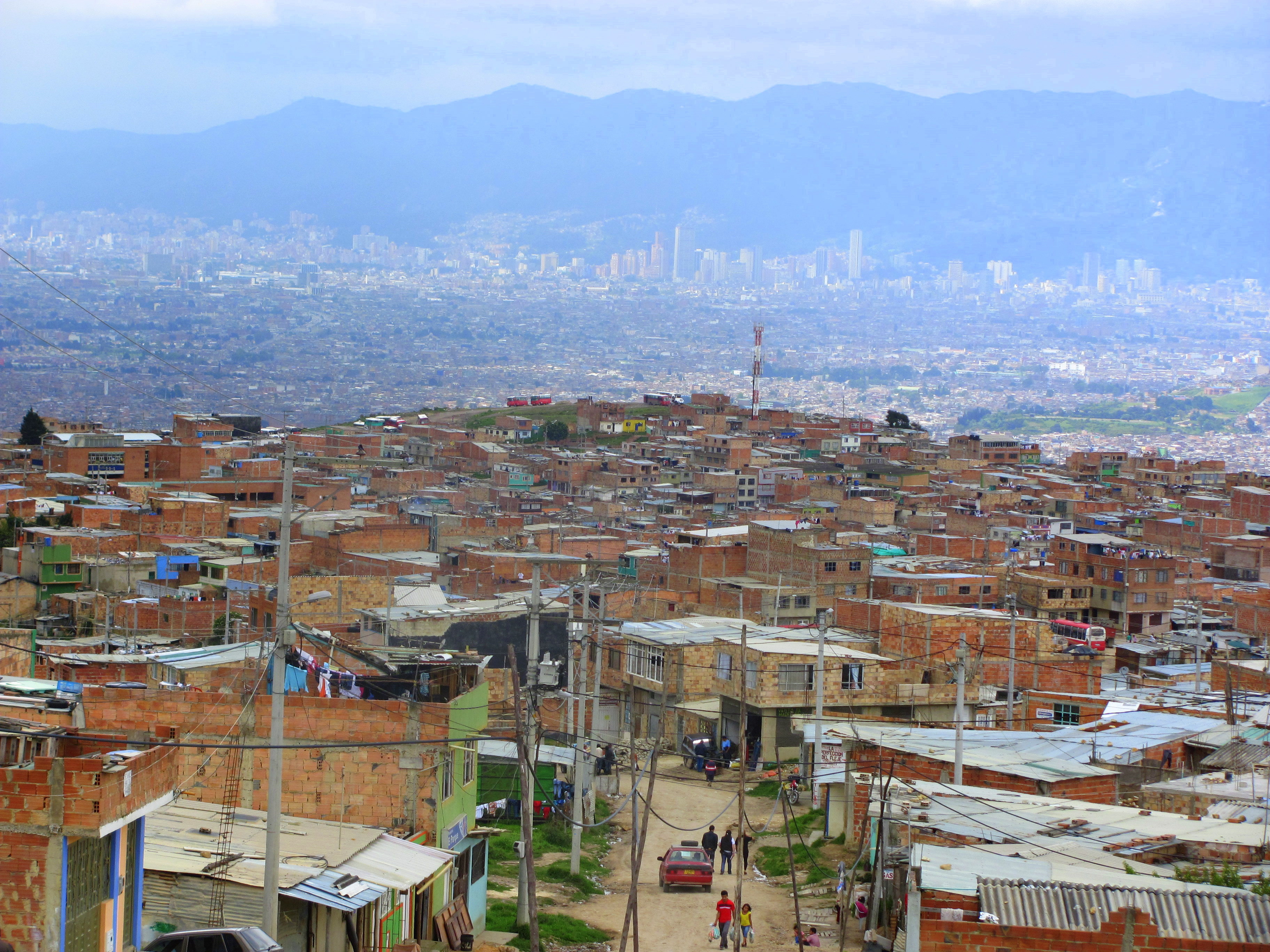
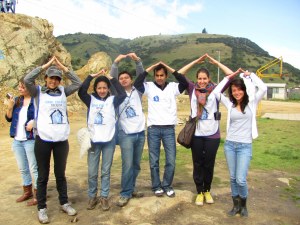



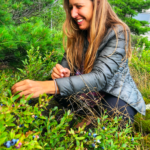
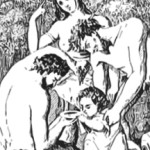

A beautiful post, Talia. To let the reader experience emotions through words is quite the talent.
Thank you 🙂